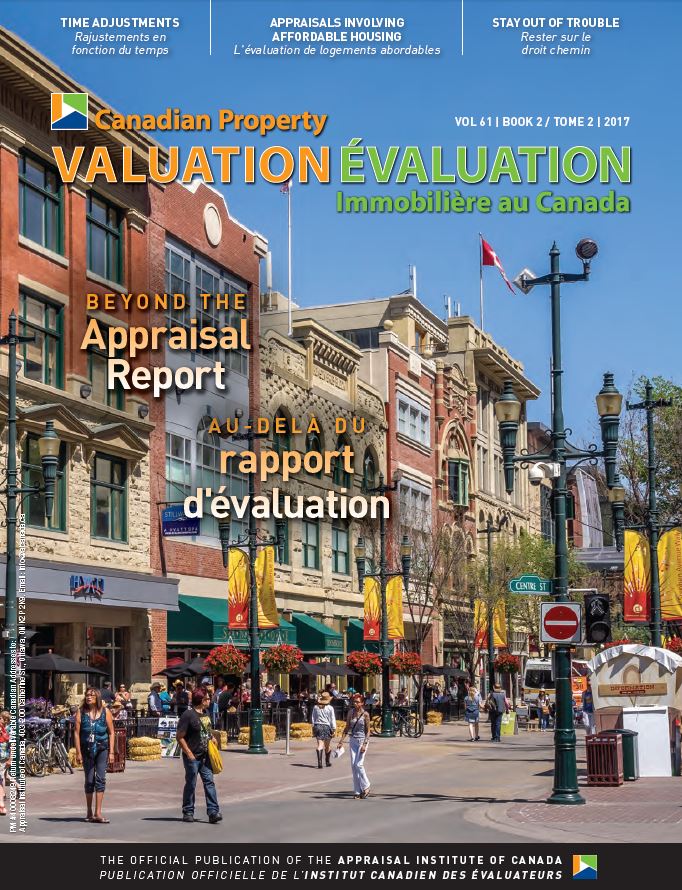Professional Appraiser’s Perspective: On appraisals involving affordable housing
Canadian Property Valuation Magazine
Search the Library Online
Professional Appraiser’s Perspective: On appraisals involving affordable housing
Adam Dickinson, AACI, P.App is part owner and secretary-treasurer of de Stecher Appraisals Ltd. in Saint John, New Brunswick. In addition to his work on appraisal and consulting assignments for a variety of property types, he is involved with affordable housing properties multiple times each year. In 2014, he presented a seminar on appraising affordable housing at the annual conference of the New Brunswick Association of Real Estate Appraisers (NBAREA) and presented about the AIC at an affordable housing conference in May of this year.
What types of property come into play when you are talking about affordable housing?
Affordable housing can range from single-family homes to large apartment complexes. These include rent-to-own single-family homes and ‘sweat-equity’ projects, where a family can help to build an affordable house.
Small apartment buildings can be managed by co-operatives to create affordable options. Co-ops and other non-profit groups also manage larger apartment buildings in urban and suburban markets. As well, I have seen community groups run affordable housing complexes in smaller communities with few rental options.
There are also large multi-building affordable housing communities that are often publicly owned or managed.
In addition, an appraiser dealing with affordable housing may encounter land or an older building (such as a school or a church) that a developer may want to convert into housing.
Affordable housing properties may be completely occupied on an ‘affordable rent’ basis, though many developments include mixed-income communities.
What role does an appraiser typically play in the valuation of affordable housing?
Appraisers often get involved in affordable housing when a housing group is seeking financing. A lender may want to have a third party estimate of market value before loaning money to a proposed or an existing affordable housing property. For some housing groups, the first time they will deal with an appraiser is when they seek new financing options after their traditional funding models have changed.
Another critical role appraisers are able to play is helping groups to understand the housing market in an area. I have been able to assist affordable housing groups understand market rents when they are planning mixed-income developments. Understanding what sort of apartments are demanded in a market, and also what type of units are needed in the market, are critical for groups building a case to move forward with a project. Appraisers understand the local market and are able to provide useful insight to affordable housing groups.
Are there aspects of the appraisal process unique to affordable housing properties?
One thing to consider is whether or not there are property tax advantages to a particular affordable housing use. If the property taxes are lower for an affordable housing use, then an appraiser needs to make sure this is considered when talking about highest and best use and analyzing the income approach.
Another consideration is how different funding programs might impact the income of a property. If an owner has committed to lower rents than would be typical in the market, an appraiser needs to interpret how this commitment might impact value. On the flip side, if a property is being filled by a housing program that leads to below market vacancy, this could also play a role in highest and best use and impact the value estimate.
Logistically, dealing with some smaller scale affordable housing groups can be unique from other assignments. If you are dealing with a group of volunteers running a housing property, then you might need to do more work explaining your process and defining your scope of work.
Are there different levels or degrees of complexity in affordable housing projects?
Affordable housing appraisal and consulting assignments can vary widely in scope. At one end, an appraiser might be providing a standard point-in-time value estimate for a small apartment building with straight forward rental agreements. At the other end of the spectrum, an appraiser could be providing consulting services that analyze the best unit mix for a development and how different rental programs could impact the financial health of a real estate asset.
The level of complexity may also increase when an appraiser’s client has a diverse range of needs: a client might want to know what a property is worth under different scenarios, which can lead to a more in-depth analysis.
Are there specific standards of practice relative to affordable housing projects?
One key element involves defining your scope. If an appraiser takes time to explain to the client what he or she can and will be doing for an assignment, the client will be better served and the work produced will be more useful.
As affordable housing groups often use appraisers in planning for new projects or adapting existing properties, we need to consider extraordinary assumptions and hypothetical conditions in completing work. For instance, an affordable housing group may need to know the value of a property under the assumption that they will receive a zoning variance that might not be granted to a standard for-profit or market-rent property.
What types of professionals or organizations can be involved in affordable housing valuation?
Appraisers are often involved in helping affordable housing groups understand the wider rental market for housing and how their properties fit in that market. To this end, it is common for appraisers to draw on information and resources from government agencies that help facilitate the development of housing. Appraisers also work with government agencies in understanding the role of different affordability programs in the operation and development of various housing types.
Volunteer groups that run affordable housing properties are often the appraiser’s clients for this type of work. These groups often have deep institutional memory and can provide valuable context when analyzing properties.
As with many other types of appraisal assignments, it is common to deal with a group’s accountant and insurance professionals in making sure the work completed is accurate and useful for the client. Architects can also play a role when assignments involve analyzing feasibility or estimating the market value of a property ‘as if complete.’
Is it usually a multi-team approach involving different types of professionals?
Appraisers might team up with accountants and architects in providing feasibility or highest and best use studies for affordable housing groups. We have been brought into projects by consultants providing market studies to affordable housing groups, and have worked to provide architects with financial (rent and operating expense) information that helps them guide their clients through the design process.
What specific skill sets would an appraiser require to effectively conduct or contribute to the valuation of affordable housing?
While it is critical to be objective in providing one’s professional opinion, it is important for an appraiser to understand and empathize with the goals of an affordable housing organization. This understanding will allow you to provide advice to the client that is respectful of their organizational goals; after all, not every client is in the business of maximizing profit before all else.
Working with affordable housing groups requires appraisers to clearly articulate the scope of their work and the basis of their conclusions. Often times, when dealing with housing groups, it is important to realize that there may be limited experience in dealing with appraisal documents, so it is incumbent on the appraiser to be patient in providing explanations to clients.
What are the biggest challenges an appraiser might face in carrying out an appraisal involving affordable housing?
The biggest challenges are timelines, properly defining scope of work, and managing expectations. When it comes to timelines, some of the projects span months and even years, as the developments tend to evolve as new programs and plans become available. It is also important to realize when dealing with non-profit clients that you might be waiting months for boards to meet and approvals to be given.
For defining scope, it is often important to meet with a client and other stakeholders, such as lenders, to make sure the appraisal you are being asked to complete is relevant to the group’s need. For instance, one non-profit group asked if they could use a replacement cost analysis of a decades old building as a market value basis for borrowing. If you explain the process along the way, clients tend to be more satisfied with the result, even when they might not agree with your conclusions.
Is this a growth area for appraisal practice?
One area where there has been growth involves churches and other civil society groups refocusing their efforts in providing public services. I have had the opportunity to provide analyses for groups that had surplus land, available funds, or, in one case, a vacant building with redevelopment potential. These groups tend to seek advice before starting a project and are often willing to seek advice from professionals when making decisions.
Another area where appraisers could see increased opportunity relates to the expiration of operating agreements. Various funding programs have started to expire and continue to expire, which is changing the way many housing groups operate. After decades of operation, some groups may be seeking mortgages from the private market for the first time, and could require appraisals for the first time. Other groups may need to undergo restructuring, which could involve selling off buildings or analyzing how they can integrate market rent units into their affordable housing properties. As experts in property value and rental market analysis, appraisers can provide important insight and assistance to groups that might be new to considering such issues.
How can an appraiser go about obtaining work in this area?
My introduction into the appraisal of affordable housing came through contacts I made when volunteering in the sector. I worked for eight years on the board of an affordable housing group (Abbey St. Andrew in Saint John, NB), and made many connections throughout that time.
If you are not able to be involved with housing groups in a volunteer capacity, it would be useful to reach out to key affordable housing managers in your community. Often, these groups have meetings and education sessions for staff and volunteers. An appraiser could consider being a speaker or sponsor for these type of events.
Can you give us a brief background on your appraisal career?
In 2005, I was a university co-operative education student for de Stecher Appraisals. I started working in the industry full time in 2006, when I became a Candidate through the Appraisal Institute of Canada (AIC). After completing the Post Graduate Certificate in Valuation (PGCV) program, I received my AACI designation in 2009.
On a volunteer basis, I have served as vice-president, president and past-president of the AIC’s New Brunswick affiliate, the New Brunswick Association of Real Estate Appraisers (NBAREA).
Why is the concept of affordable housing so important to you?
Working in Saint John has given me lots of exposure to unsafe and unaffordable housing. The community has high levels of childhood poverty, and a significant need for affordable housing. As a volunteer in the affordable housing sector, I have witnessed how important housing can be in making lives better. Volunteering and providing professional services to the affordable housing sector gives me the feeling that I am helping our community.





